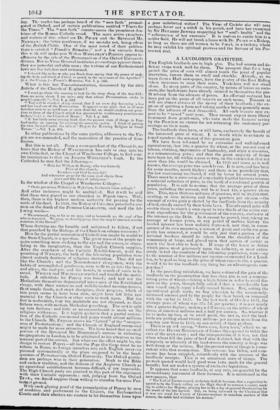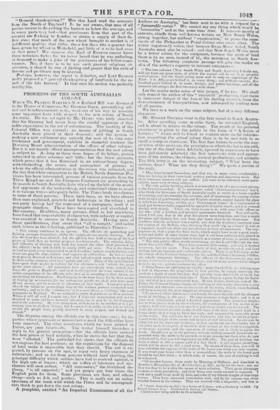A LANDLORD'S GRATITUDE.
THE English landlords are in high glee. The bed season and de- ficient crops work well for them. The prospect that for a long period the priee of corn will almost touch the point of popular starvation, causes them to swell and chuckle. Already, as we learn from a Hull newspaper, have the gentry of the East Riding taken measures to raise their rents. Yorkshire will not stand alone. Li tnany parts of the country, by means of leases on corn- rents, the landowners have already secured to themselves the pro- fit arising from the advance of prices. An effectual restraint has been put on the gains of all tenants on such terms. Tenants at will are almost alwa% s at the mercy of their litedlords ; the ex- pense of quitting a farm and taking another being generally more than the advance of rent demanded. All such !clients may ex- pect to he " raised " next year. They cannot expect more liberal treatment from gentlemen, who have made the farmers' saving by the Poor-law an excuse for not returning the customary per- centage on their rents.
The landlords then have, or will have, exclusively the benefit of the increased price of wheat. It is worth while to estimate in round numbers the amount of this pecuniary gain.
We have been infirmed by an extensive and well-informed agriculturist, that 50s, a quarter for wheat, at the pre-cat cost of labour, clothiwa, implements of husbandry, and other rweessaries, is a remunerating price; and that the great majority of farms have been let, till within a year or two, on the calculation that not more than 50s. would be obtained. In 1835 awl since, as is well known, the average price was much lo ver. It is now, and has been for some months, much higher; and there is no probability that, the law continuing unaltered, it will be lower for several years. There must be a succession of remarkably fruitful harvests to cause a material reductioa of price, in the teeth of a continual growth of population. It is safe to assume that the average price of three years, including the present, will be at least 15s. a quarter above 60s. This, upon thirteen millions of quarters, will be 29,250,000/. sterling, or nine millions and three quarters per ansum.—the amount of extra gain pscketed by the landlords teem the scarcity of food, chiefly caused by their Corn laws. The advanced price will enable them to clutch a sum equal to two-thirds of the entire cur- rent expenditure for the government of the country, exclusive of the interest on the Debt. As it cannot be proved, that, taking an average of former years, at any period of modern history the landed interest has been unfairly depressed, now that, in conse- quence of its own measures, a season of great and exclusive pros- perity has occurred, it would be only just that a portion of the national burdens should be taken from the shoulders of the community at large, and placed upon that section of society so much the best able to bear it. If some of the taxes or duties which press most grievously upon the industry, or most exten- sively eurtail the comforts of the labouring population, were—say to the amount of five millions per anuum—cominuted for a Land- tax, to be paid as long as the price of wheat exceeds 50s. a quarter, would it be for the landlords any thing but an advuntageoua cum- pus tion ?
In the preceding calculation, we have estiinaied the gain of the landlords on the presumption that less than 50s. is not it remune- rating price of wheat,—taking a high figure in order to avoid dis- pute on the point, though fully satisfi el that a considerably less sum would amply repay a fairly-rented farmer. But, setting the agricultural profit aside, we beg attention to the eaormously- increased amount paid by the people for their bread, as compared with the we lay in 1835. In the last week of Oetob.ir 1835, the average price of wheat was 37s. 7d. per quarter; it is 11../W nearly 30s. a quarter higher • makina a &Wen:lice, on the article of wlvat alone, of nineteen millions and a hall' per annum. So, whether it be to make up loss, or to swell profit, the fact is, that the land- lords are getting about twenty millions per annum more from the country now than in 1833, on one article of their produce. There is an old saying, " down corn, down horn," which we re- collect the HENRY BROUGHAM Of former (lit) a quoted to tickle the ears of the aristocracy ; awl the interpretation of it was, not that when wheat fell the price of beef also declined, but that with the prosperity or adversity of the landowners the country at large was well-doing or the reverse. But the present state of things is incon- sistent with that assumption. The revetme has fallen, and com- merce has been crippled, coincidently with the increase of the landlords' receipts. This is an unnatural state of things. The proverb quoted would hold good were laws made for the general benefit; but not under a system of exclusive legislation. It appears that some landlords, at any rate, are grateful for the extraordinary increment of their fortunes. It is mentioned in the newspapers, that " The Earl of Euston moved, at the late Suffolk :Sessions, that a requisition be
agreed to by the Court, calling on the High Sheriff 0, convene a county meet- too' to address her Illaiesty, praying her to fix a day of general thanksgiving for the result of the late harvest. But, on being informed by the Chairman that it was not usual for Courts of Quarter-sessions to enteitaiu matters of this nature, the noble lord withdrew his motion." "General thanksgiving 2" Has this Lord read the accounts Authors on Australia," has been sent to us with a request for a er,,to the North of Ene land ? Ie he not aware, that men of all "favourable notice." We cannot say any thing which would be parties concur in describing the harvest as below the average, and "favourable" and at the same time true. It consists mostly of in many parts very bad—that purchasers from that part of the extracts, chiefly from well-known writers on New Smith Wales, country are flocking to London to obtain a supply of their de- strung together, but without "examination," to prove the supe- era!: cies; that much of the new wheat brought to market is of riority of the Pickpocket or Penal Colony over evert ether. The indifferent quality; that withie these few days 80s. a quarter has writer sagaciously infers, that because Swan River failed. South been given for wheat in Wakefield, awl little of it to he had even Australia must also be ruined ; awl that New Satoh Wiles must at that price? We suppose the Earl of EUSTON cannot know be a better colony for the emigrants, because the price of land these notorious tarts; for we never heard that he was unfeeling, there is es. an acre, instead of U., the minimum ii) South Aus- or disposed to make a joke of the grievances of his fellow-coun- tralia. The following prophetic passage will eive the reader an trymen. No; if there is to be anc such general religious ole idea of the author's capacity to instruct emigrante- eervance, it shored he one of fasting and prayer that the evils of o The two colonies (New South Wales and South Aostrali t) I doubt not,.
famine and pe4ilence may be averted, will yet form one great state, of which the capital will be tot th ate splendid
really proposed a " izenerel thanksgiving of landlords for the re-
stilt of the late harvest." In that case his motion was perfectly intelligible.



























 Previous page
Previous page